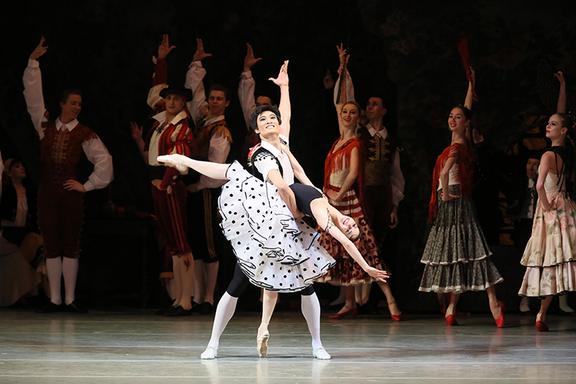With an exhibition prepared by the Bolshoi Theatre Museum and concerts by members of the Young Artists Opera Programme, the Bolshoi began its Year of Rachmaninov. On the 9th of April, Rachmaninov’s music will sound on the Historic Stage of the theatre. The first large-scale programme in honour of the 150th anniversary of the composer’s birth includes the All-Night Vigil and the opera Aleko. The performers are the orchestra, choir and soloists of the Bolshoi opera troupe. Conductors — Valery Borisov and Alexei Vereshchagin.
The opera Aleko was first heard in 1893 at the Bolshoi Theatre. By that time, Rachmaninov was already known to Muscovites as a virtuoso and talented pianist, however, it was that opera which launched his professional career as a composer.
When the composition professor, Anton Arensky, invited three of his students — Sergei Rachmaninov, Nikita Morozov and Lev Conus — to write an opera to a libretto written by Vladimir Nemirovich-Danchenko based on Pushkin’s poem The Gypsies as their graduation work, it was only Rachmaninov who managed to complete the task. Arensky took too long to choose the libretto and there was catastrophically little time left to write the music, so two of Rachmaninov’s fellow students dropped “out of the race”. Not only did Rachmaninov, on the other hand, manage to write the music in a record short time, but also completed the orchestration, with which he amazed both the professor and the entire graduation committee. For Aleko the composer received a Grand Gold Medal, and his name was engraved on a marble plaque in the lobby of the Moscow Conservatory. Moreover, the opera was highly appreciated by none other than Pyotr Ilyich Tchaikovsky himself. He made his contribution to it being staged at the Bolshoi Theatre, and even suggested that Aleko was performed on the same evening as his Iolanta! The premiere, at the insistence of Tchaikovsky, was attended by the director of the Imperial Theatres, Ivan Vsevolozhsky, while Pyotr Ilyich, according to contemporaries, applauded so much that he nearly fell out from the director’s box.
Despite such a brilliant start, the opera Aleko did not take root in the theatrical repertoire. The plot, which tells of the love and betrayal of the gypsy Zemfira, is somewhat similar to the plot of the famous Carmen and makes the opera both attractive and difficult to stage. On the one hand, this opera has everything needed to become a real hit: drama, catchy solo numbers and even dancing. On the other hand, the melodrama of the libretto, which simplified the Pushkin poem greatly, the pronounced romanticism, the elation of feelings inherent in it, present a serious complication for both directors and performers, putting their taste and sense of proportion under immense pressure.
Soloists of the opera troupe and guest artists of the Bolshoi Theatre participate in the concert performance of the opera: Elchin Azizov (Aleko), Anna Shapovalova (Zemfira), Alexei Tatarintsev (Young Gypsy), Andrey Valenty (Old Man), Irina Dolzhenko (Gypsy Woman).
It took Rachmaninov less than twenty days to create Aleko, which, as it turned out, was not the limit of the composer’s ability. It took him even less time — just two weeks — to create a work which would become one the pearls of the Russian liturgical music: the All-Night Vigil. The All-Night Vigil is a type of Orthodox worship performed on the eve of holidays. Traditionally, such a service consists of three parts: Vespers, Matins and the First hour. Rachmaninov repeats this structure in his score: Vespers (№№2 – 6), Matins (№№7 – 15) and prologue.
The All-Night Vigil is based on authentic ancient melodies — everyday Znamenny chants, which the composer reworked and musically enriched. Melodies for some numbers, where it was permissible and did not violate the tradition, Rachmaninov composed himself. All music is imbued with the atmosphere of an ancient mystery. Already from the first chords, the listener feels the epic tone of the narration, regularity and solemnity, followed by penetrating lyrical numbers with high pitch solo voices.
Written in 1915, the All-Night Vigil was banned after the October Revolution, like everything else connected with a religious cult. It was only in 1965 when the State Academic Russian Choir of the USSR, conducted by Alexander Sveshnikov, recorded the All-Night Vigil for the first time, but the full return of this music to concert venues became possible only at the end of the 20th century.
